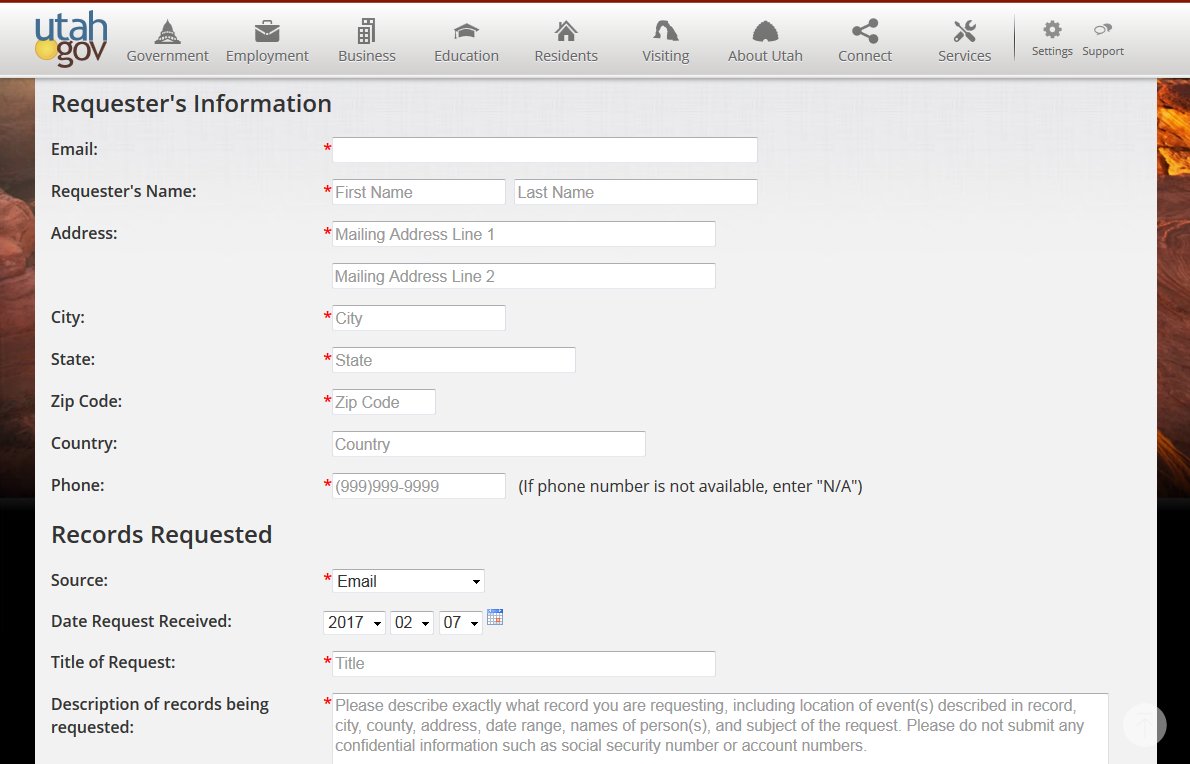How to File a Request for Records Under GRAMA
WHAT IS A GRAMA REQUEST?
The Government Records Access and Management Act (GRAMA) provides every person the right to request records from any governmental entity in Utah (Utah Code Section 63G-2-201(1)).
WHAT CAN BE REQUESTED?
Almost all government records are subject to request, however access to some records is restricted. Upon receipt of a request the governmental entity will determine the classification and provide the records and/or a response, which may be a notice of denial. Definitions of record and governmental entity are found in GRAMA (Utah Code Section 63G-2-103(11),(22)).
WHERE SHOULD A GRAMA REQUEST BE SENT?
A person making a request must submit it to the governmental entity that maintains the desired record. So, determine which agency is most likely to have the records in which you are interested. For example, if you are seeking records about water usage, contact the appropriate municipality. If you are interested in records about water rights, contact the Water Rights Division of the Utah Department of Natural Resources.
HOW TO PREPARE AND SUBMIT A REQUEST.
The request must be in writing and must include the requester’s name, address, telephone number (if available), and a specific description of the records(s) requested (Utah Code Section 63G-2-204(1)). The easiest method to prepare and submit the request is through the Open Records Portal. You may also use an agency’s request form or a generic request form provided by the Utah State Archives.
A request can be filed in one of five ways:
- Open Records Portal
- Fax
- U.S. mail
- In person
Make sure the request is specific and concise in order to help the agency quickly locate and identify the records you are requesting. No matter how you submit the request, be sure to address it to the records officer.
TO WHOM SHOULD THE REQUEST BE ADDRESSED?
Each governmental entity has a records officer who is responsible for responding to requests. Names and contact information for most records officers are listed in the Open Records Portal. Every agency, whether state or local, is required by GRAMA to appoint a records officer. This is the person to whom you should address your request.
There are several ways to find the records officer’s contact information:
- Records officer’s names are provided in the Open Records Portal. Requests submitted through the portal automatically go to the records officer.
- Records officer’s names are often provided on agency websites, and sometimes agency websites have links to the Open Records Portal or to forms that can be filled out electronically scanned and mailed.
- If no records officer’s contact information is available, simply address the request to “Agency GRAMA Responder” and send it to the agency’s main address.
HOW LONG DOES IT TAKE TO RECEIVE A RESPONSE? The law allows records officers up to ten business days to respond, but suggests that they respond as soon as reasonably possible.
WHAT ARE SUGGESTIONS FOR EFFECTIVE GRAMA REQUESTS?
- GRAMA requests are not questions. GRAMA is designed to provide access to records. It is not the place for the public to request answers to questions. For example, do not submit a GRAMA request saying, “Why didn’t my street get plowed until a day after the latest snow storm?” Instead, an effective GRAMA request would be, “I am seeking records regarding the snowplowing schedule in this municipality. In particular, I seek specific records about the snowplowing schedule for Main Street.”
- GRAMA requests may have associated fees. Filling a request is always free but governmental entities are allowed to charge fees for the actual cost of providing records. (Utah Code Section 63G-2-203)).
- Many records are available on line. More and more records are becoming available on agency websites and on the Open Records Portal. The Transparent.Utah.gov provides resources and links to state and local government annual expenses, revenue, and employee compensation The Utah Public Notice Website provides records of open and public meetings including agendas, minutes, and audio recordings.
- Retain a copy of the request. A copy of your request will be necessary if you are denied access to any records and later decide to file an appeal to the State Records Committee or to district court.
Requesters with questions or concerns may contact the records ombudsman.

Page Last Updated March 12, 2024 .
